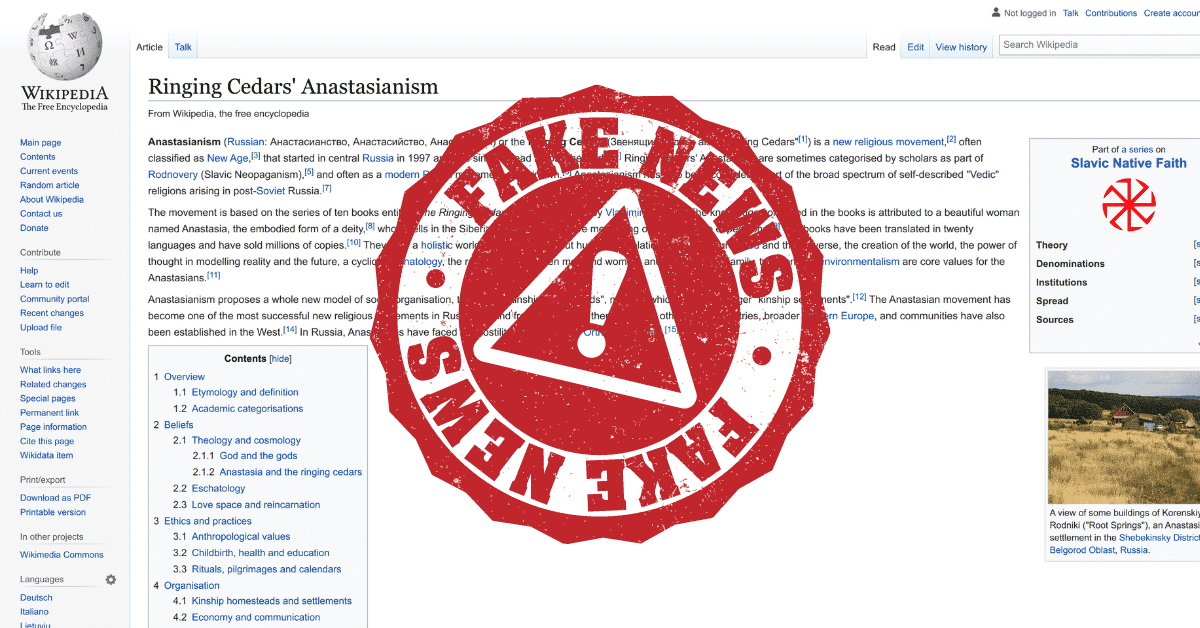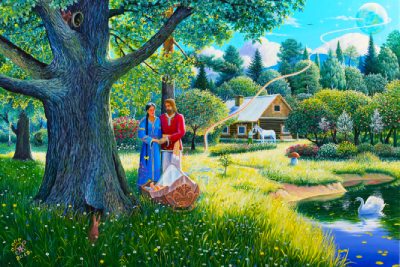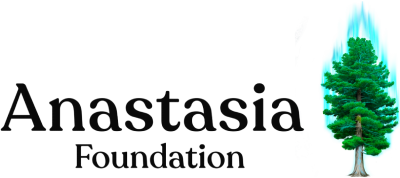If you have ever searched for the term “Ringing Cedars” on Google, you have no doubt seen the Wikipedia article titled “Ringing Cedars’ Anastasianism” at the top of your search results.
Why this particular article appears at the top of the search results is a mystery to me, as every Ringing Cedars reader I have spoken to about it (dozens of them, across multiple countries) agrees that it is a misleading representation of what the Ringing Cedars movement is truly about.
I believe this article, especially the beginning, has the effect of immediately putting people off, and I would like to prevent that from happening, so I will explain where it is misleading and why.
The Biggest Problem: Dissecting the Opening Statement
The opening statement of the article is where I see the biggest issues. The way it’s worded has a way of putting people off from reading more. That’s what concerns me about this article; people who are coming to learn about something new to them, the Ringing Cedars, not wanting to learn anything after reading how the opening statement (quite inaccurately) classifies the Ringing Cedars movement.
The following is the text from the first paragraph (as of 5/30/2021)
Anastasianism (Russian: Анастасианство, Анастасийство, Анастасиизм) or the Ringing Cedars (Звенящие Кедры; also “Jingling Cedars”[1]) is a new religious movement,[2] often classified as New Age,[3] that started in central Russia in 1997 and has since spread across the world.[4] Ringing Cedars’ Anastasians are sometimes categorised by scholars as part of Rodnovery (Slavic Neopaganism),[5] and often as a modern Pagan movement of their own.[6] Anastasianism has also been considered part of the broad spectrum of self-described “Vedic” religions arising in post-Soviet Russia.[7]
Every label/categorization given in that statement is a label applied by someone outside of the Ringing Cedars movement. No one who has read the books would actually describe any of it that way, except for the part about it starting in 1997 and spreading across the world.
Anastasianism (Russian: Анастасианство, Анастасийство, Анастасиизм) or the Ringing Cedars (Звенящие Кедры; also “Jingling Cedars”[1]) is a new religious movement,[2] often classified as New Age,[3] that started in central Russia in 1997 and has since spread across the world.[4]
The first sentence: There is not a single reader, and I have been in contact with hundreds and perhaps thousands over the years, who would use the word “Anastasianism”. Most people, when discussing the ideas in the books, say things like, “Anastasia said…,” or “Vladimir said…”. None of us use the word “Anastasianism” to describe our ideas or beliefs.
Next, a smaller issue, the second translation of “Звенящие Кедры” to English is wrong; they translate it as “Jingling Cedars”, even though Megre himself and even Google Translate translate it as “Ringing Cedars”.
The Ringing Cedars in Not a Religion
And my last and most important point that we’ll be discussing more in this article, is the claim that “the Ringing Cedars is a new religious movement,[2]”
The Ringing Cedars movement is not a religion. Anastasia never once referred to anything she was saying as creating a “religion”, and neither did Megre. As Wikipedia states further down in their article, “The books do not expound doctrines in a systematic way, and are characterised by “adogmatism and variability“. None of us who have read the books and are putting the ideas into practice in our own lives describe ourselves as followers of a religion or promote the ideas as such.
The views and consciousness of Ringing Cedars readers is truly just that; a particular consciousness and world-view. It is inclusive of all religions, to the exclusion of none.
The definition of the word religion is the following (according to Oxford Languages via Google):
Re·li·gion
noun
the belief in and worship of a superhuman controlling power, especially a personal God or gods.
“ideas about the relationship between science and religion”
1. a particular system of faith and worship.
plural noun: religions
“the world’s great religions”
2. a pursuit or interest to which someone ascribes supreme importance.
“consumerism is the new religion”
The main thing to realize here is that there is no “worship of a superhuman controlling power” in the Ringing Cedars ideas.
Indeed, Anastasia makes statements against “worship” such as:
“In God’s Sight, Vladimir, all people are equal. They should not bow down to one another.”
“But worship does not mean love [emphasis mine]. It only exhausts the worshipper’s power of thought — a power exclusive to Man.”
“It is painful for any father to see his son bowed down and enslaved. It is only the dark forces that have always tried to demean Man’s significance. Vladimir….refuse to betray yourself.”
(from the chapter “Your desires”, pages 248-249 in Book 5 of the Ringing Cedars of Russia series, “Who Are We?”, by Vladimir Megre)
If readers of the Ringing Cedars books don’t believe in “worshipping” God or any other power, then what do we believe?
Here is what Anastasia said:
“Many religions through the ages have talked about God, but not one of them has ever stated the obvious: in consciously communicating with Nature, Man communes with the Divine thought. To understand Space is to understand God.”
(from the chapter “Glad tidings”, page 235 in Book 6 of the Ringing Cedars of Russia series, “The Book of Kin”, by Vladimir Megre)
“And every family created in its [kin’s] domain a Space of Love, they felt the wholeness of Nature and, consequently, of everything God had created.”
“What happened in Vedism was that people spoke with God through Nature. Instead of bowing down before Him, they attempted to understand Him. They loved God as a son and daughter love their kindly parents.”
(from the chapter “A change of priestly tactics”, page 186 in Book 6 of the Ringing Cedars of Russia series, “The Book of Kin”, by Vladimir Megre)
That is the way Ringing Cedars readers view God. Readers of the books do not consider themselves followers of a religion or worshippers of any power. They are people who love the Earth, love God, and are working to create a truly happy life for themselves and their families.
Continuing to Dissect the Opening Statement
The next part of the opening statement reads:
Ringing Cedars’ Anastasians are sometimes categorised by scholars as part of Rodnovery (Slavic Neopaganism),[5] and often as a modern Pagan movement of their own.[6] Anastasianism has also been considered part of the broad spectrum of self-described “Vedic” religions arising in post-Soviet Russia.[7]
Again, readers of the books don’t refer to themselves as “Anastasians”.
More importantly, the Ringing Cedars movement is definitely not “Slavic Neopaganism”.
Anastasia makes no mention of any “gods” (besides the supreme creator Himself). There is no pantheon of “gods” or spirits to be worshipped (indeed, there is no worship at all as we have already established). There are no religious ceremonies. Anastasia makes no mention of religious ceremonies at any time.
Wikipedia goes on to state in the article on Slavic Neopaganism:
Rodnover [Slavic Neopagan] ethical thinking emphasises the good of the collective over the rights of the individual. The religion is patriarchal, and attitudes towards sex and gender are generally conservative. Rodnovery has developed distinctive strains of political and identitary philosophy. Rodnover organisations often characterise themselves as ethnic religions, emphasising that the religion is bound to Slavic ethnicity.
None of that applies to the Ringing Cedars books or movement at all. Anastasia and Vladimir Megre have never “emphasised the good of the collective over the rights of the individual” at any point in time. In fact, creating a Kin’s Domain, which is the central idea of the books, is about creating the happiest possible life for your individual family. When people come together and create Kin’s Domain Settlements, they are all people primarily concerned with the happiness of their own families first and foremost, and secondarily with coming together with others to live the same kind of life.
As for the statement that “Rodnover organisations often characterise themselves as ethnic religions, emphasising that the religion is bound to Slavic ethnicity,” again the Ringing Cedars readers do not constitute a “Rodnover” organization, and not a single reader believes this is an “ethnic religion”. Just because the ideas originate from Russia does not mean that they are for Russia only. Indeed, Anastasia makes no mention of these ideas belonging exclusively to one race or nationality anywhere in the entire series.
The reason why Wikipedia would attempt to classify the Ringing Cedars movement as Slavic Neopaganism is that Anastasia does discuss the Vedruss and afterward pagan cultures that came before our present society, their ways of life, and their beliefs.
Simply by mentioning these things people find it easy to say that the Ringing Cedars ideas are pagan. But it is not that simple. In order to understand this fully, we need to understand what the Vedruss culture was, and what Anastasia herself said about paganism.
What Is the Vedruss culture?
I believe it is important to establish an understanding of what the Vedruss culture that Anastasia describes was, in order to differentiate everything Anastasia talks about from what Wikipedia says is “Slavic Neopaganism”.
Throughout the Ringing Cedars series, Anastasia shares many stories, the history, details about the lifestyle, and consciousness of the Vedruss civilization as a way of transmitting that information to us in the present day, to help us reach a higher understanding of the Universe and life, and to improve our present day lifestyles.
What is the Vedruss culture (“Ved” meaning “knowledge/to know” and “Russ” referring to the land now known as Russia)?
Vladimir asked Anastasia (in book 6 of the series), “Well, for instance, what ethnic background are you Anastasia? What religion are you and your relatives? Or maybe you don’t have any ethnic background?”
Anastasia replied: “I am a Ved-russ, Vladimir.”
“Have your people died out, Anastasia? Or rather, are there just a very few of them left? Where were they settled previously?”
“Our people have not died out, Vladimir, they are dormant. Our people happily thrived on the territories now known as Russia, Ukraine, Belarus, England, Germany, France, India, China and many other states both large and small.
“Up until quite recently, only five thousand years ago, in the real world our people were thriving on lands from the Mediterranean and Black Sea to the farthest northern latitudes.
“We are Asians, Europeans and Russians, as well as those who recently called themselves Americans — in fact, god-people, all from a single Vedruss civilization.
“There was an age of life on our planet known as the Vedic Age. […]
“Three thousand years ago they were thriving only on what is now Russian territory. At that time the age of the dark forces had already come upon the whole Earth. And the Vedruss continued their happy existence only on the ‘island’ now known as Russia.
“They needed, very much needed to hold out another thousand years. […] They managed to hold out another fifteen hundred years on this ‘island’ […] that is today called Russia.
“The civilisation of the Earth, the people who knew God…”
“In the Vedic Age Man does not raise questions about how or by whom the world, the Universe, the galaxies — along with his marvellous planet called Earth — were created. Everyone is completely aware that everything around, either visible or invisible, has been created by their Father, namely, God.
“The Father is everywhere! All that grows and lives — are His living thoughts, His programme. And one can use one’s own thought to commune with the Father’s thoughts. And one can contribute to His programme, provided one first understands it in detail.
“During the Vedic Age Man did not bow down before God, nor was there the multitude of religions which sprang up afterward. There was a culture to life. People lived a Divine way of life.
“Human society on the Earth consisted of happy families. The various continents were inhabited by families. They were all united by their aspiration to create a Space of Splendour. […]
“Families were formed by the energy of Love. And everyone was fully aware that a new family would create one more oasis of splendour on their native planet.
“The Vedic people knew why the stars are in the sky. Their numbers included a great many poets and artists. There was never any rivalry among the communities. There was no cause for crime or violence. And there was a complete absence of hierarchical structures. The Vedruss culture flourished on the territories of our modern nations of Europe, India, Egypt and China, and there were no lines of demarcation dividing the various areas of land. There were no rulers, either important or petty.
(from the chapters “Vedism”, “The history of mankind, as told by Anastasia”, and “A dormant civilization” in Book 6 of the Ringing Cedars of Russia series, “The Book of Kin”, by Vladimir Megre)
None of this can be considered exclusively pagan ideology, but it is universal.
Addressing Claims of Paganism
To continue on the point of Wikipedia defining the Ringing Cedars movement as a “Slavic Neopagan religion”, I would like to add the words of Vladmir Megre himself on this topic:
“The main criticism levelled against Anastasia comes down to the allegation that she is a ‘pagan’ — without even the slightest proof or examination of the ideas put forward by this taiga recluse. Though Anastasia herself clearly and distinctly called herself a Vedruss.
“Well, then, if she is a ‘pagan’, what does that imply? Japan, even today, is practically a pagan country. The Roman Empire, in its heyday, was pagan, too. Our forefathers and mothers were also pagan. But much more than that. At the time when the Egyptian state and the Roman Empire were flourishing, Vedic culture was still reigning in Russia.
“So, should we be proud of our pagan history and heritage, or be ashamed of it?
(from the chapters “Pagans” in Book 7 of the Ringing Cedars of Russia series, “The Energy of Life”, by Vladimir Megre)
Anastasia herself says she is a Vedruss. What she shares about their civilization and lifestyle doesn’t resemble anything close to what most people think of as “paganism”. Also, according to Anastasia, paganism arose in Russia after the Vedruss civilization began to decline.
And most importantly, since there are no “gods”, “spirits”, “rituals”, worship, or anything of the like in the Ringing Cedars belief system, it cannot be classified as pagan.
Having a conscious connection with nature, and with God through nature, is not the path of any particular religion, but the universal path that is open to all mankind. It is a universal experience.
Simply having a spiritual connection with the universe through nature does not make something pagan. It is an experience that every one of us could have in our hearts, if only we made that conscious connection with nature ourselves.
A Personal Story
Recently I was speaking with a woman who is an employee at a well-known nonprofit. We, as of this writing on 5/30/2021, are seeking fiscal sponsorship in order to become a nonprofit ourselves, so that is what I was discussing with her and the rest of her team on the call.
I started the call by explaining what the Ringing Cedars books were, how many millions of people have read them, and the idea of Kin’s Domains. I explained how each family takes a 2.5 acre piece of land and turns it into a small living paradise garden for themselves, with the goal of handing it down in perpetuity to their descendants. I told about how large groups of people would get together, all creating individual Kin’s Domains, and create Kin’s Domain Settlements together (large communities consisting of individual Kin’s domains). I told her about the 370+ settlements in Russia, the largest having 200-300+ families, and the massive impact they are having. And lastly, I described how this was a way of people knowing God through nature.
After I finished my explanation, a very interesting thing happened: she pulled up the Wikipedia article and told me, “Wikipedia says this is a ‘Slavic Neopagan religion’, but that’s not what it is, is it?”
She had rightly understood the ideas, and within 10 minutes of learning about the ideas for the first time was able to immediately identify that this wasn’t what the Ringing Cedars was about at all. Needless to say, I was pretty impressed and super happy about that.
The Last Issue in the Opening Statement
From Wikipedia:
Anastasianism proposes a whole new model of social organisation, that of the “kinship homesteads”, many of which constitute larger “kinship settlements”.[12]
You already know what I think about the term “Anastasianism” by this point, so let’s skip past that.
The word “kinship homesteads” that Wikipedia has chosen here literally never appears in the books at any time, ever. I don’t understand why they would choose such a blatantly incorrect translation.
The original word they are referring to is “родовое поместье” (rodovoye pomest’ye), which in the English translation of the Ringing Cedars series is “Kin’s Domain”. That is the word used throughout the first and second editions of the series.
Closing Thoughts and What I Hope to See Happen
I hope at this point you can see how the opening statements, the most important section, of the Wikipedia article are misleading and can have the effect of discouraging people from learning more about the Ringing Cedars of Russia books and ideas.
As far as the rest of the Wikipedia article goes, there are many other things that I have an issue with, but in general there is some surprisingly good information. It’s not too bad, though it’s written in a very academic and scholarly tone which I personally abhor. I won’t get into detail about the other things that I find inaccurate or misleading in this article, but perhaps in another at some other time.
In the future, I would love to see the opening statements about the Ringing Cedars movement to be changed to reflect the true ideals, goals, and consciousness of the books and its readers. I consider this possibility unlikely however.



